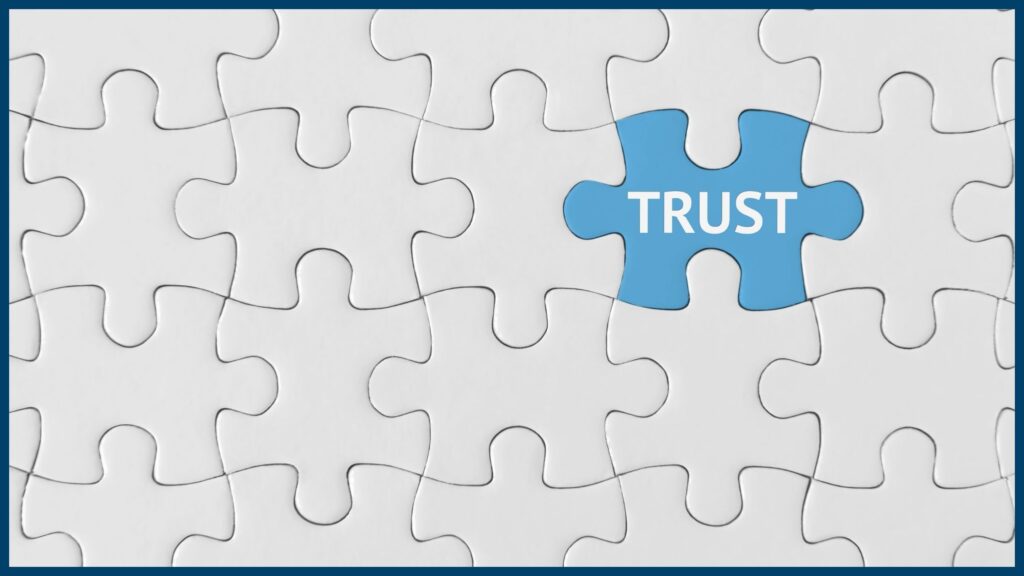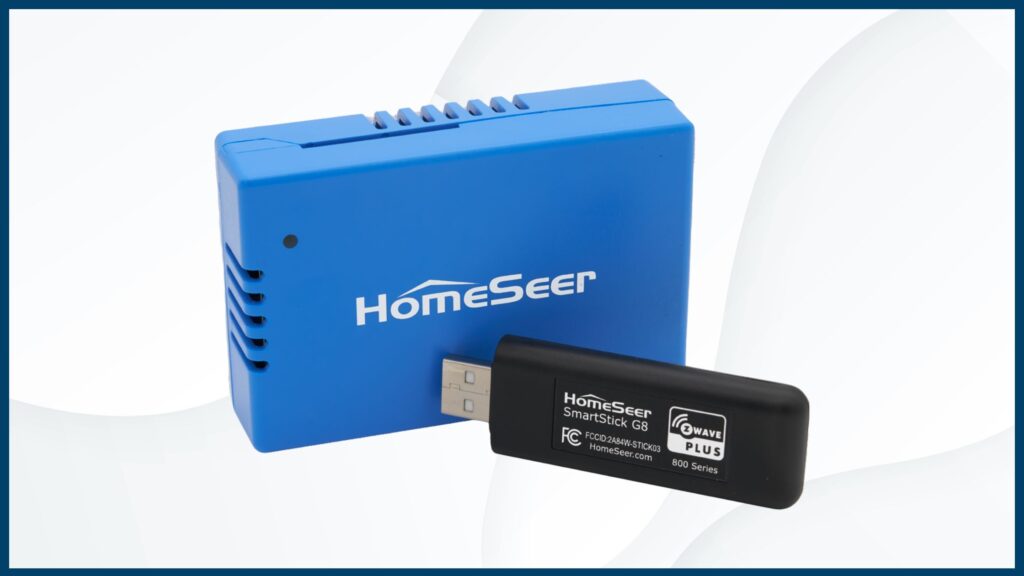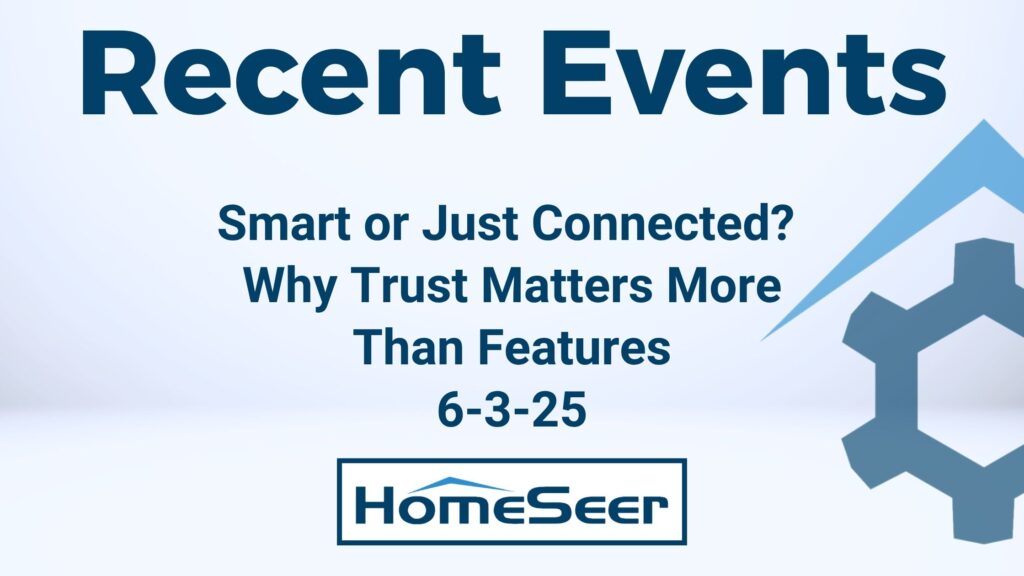A couple of weeks ago, I had a wonderful opportunity to talk about smart home technology and general tech safety alongside Patrick Hynds, the CEO of Pulsar Security at the NH Tech Alliance‘s monthly Tech Power Breakfast. Patrick talked a bit about the different digital threats to our homes, communities, and businesses and shared a few tips on how to better protect ourselves. This led to me sharing how we use this information to select the right technology and how we determine the level of trust we have in the devices around us. There were some fantastic questions afterwards, and it got me thinking – this is a topic we talk a lot about at HomeSeer, why not share it with more people?
So here we go – let’s jump into smart tech, what it is, why we use it, and how we should choose to integrate it with our lives. I’ll save more of the safety and security stuff for Pulsar to talk about
Smart What? Why?
Smart phone, smart home, smart app, smart fridge, smart pencil, smart toilet, smart what? Why? It seems like almost every piece of technology these days is becoming “smart,” but what does that even mean?
In a lot of cases, it’s just a sales term like IoT, App, and Web before it and how AI is added on to everything now, but “smart tech” is generally defined as something that meets one or more of the following requirements:
Has the ability to communicate with other devices and share data
Has sensors or other equipment that enables it to collect data about its environment or its self
Can autonomously adjust its behaviors or configuration without input from a user
Can be controlled remotely
These are great, but only the 3rd requirement demonstrates what I would consider “smart”. To me smart is more about you, the user, than it is the device. I don’t really consider the smart/auto wash on my dishwasher to be smart because it never dries dishes well. (I suspect there’s a chronic hygrometer sensor issue in tech but that’s a different conversation) I also don’t consider my air purifier to be smart just because I can connect to an app and turn it on or off from my phone. I’m constantly finding myself asking “how does any of this actually help me?” Instead, let’s define some new terms that actually make sense:
A smart home is a space that helps you make more informed decisions regarding itself and its occupants
A smart device is a thing that aides you in performing a task with less effort
Smart tech is any solution that makes a process easier and more efficient
With these new definitions, we can start to see beyond the technology part of it and get to what the value is for us as users. Is that smart home really smart if you have to keep turning the lights on when it keeps shutting them off on you? Is that smart device really smart if you have to give it the command multiple times because it fails to understand you? Smart should be more about trust and reliability; more about how it helps provide you with peace of mind. That’s smart to me.

It All Starts with Trust
I like to be able to trust my smart home. That’s one of the most important things for me. I start with these questions when selecting a new piece of tech for my home
Can I trust it to do the thing I want it to every time?
Can I trust it to last a reasonable amount of time before needing to be replaced or maintained?
Can I trust it to not be a safety or security risk for me, my family, and my home?
My ability to trust my home and the devices in my home directly impacts my peace of mind. Have you ever pulled out of your driveway, closed your garage door, driven away from your home and then wondered whether you actually closed the garage door or not? I have. It’s a bit annoying. When I trust my home and the technology I have chosen, I live more comfortably and more confidently.

Where's the Controller?
There’s one more question I ask when determining if I can trust a device that affects my answers to the other 3 questions: “where is the controller?” Most smart home devices are not controlled directly from a phone. There is usually a computer somewhere that controls the device for you. Sometimes, this computer is in your home, like with HomeSeer’s hubs. Sometimes, this computer is in the cloud. When the computer is in the cloud, you no longer have control over it, and that affects its reliability. If there is a disruption in your internet connection or the hosting company decides to perform a system update when you need to use it, you can’t control that light bulb or know if that door is open or closed.
What does all of this have to do with security though? Where something is affects how we treat its security. Do you lock up your stuff when you go to the gym? Do you lock up your stuff when you’re at home? Your trust in the environment influences your behavior. When you connect things to the cloud, you open yourself up to new vulnerabilities and, depending on where you live, it impacts the reliability of your smart home.
This consideration only affects wifi based devices. Any device that uses a local protocol like Z-Wave, Zigbee, Thread, or Matter will be communicating with a device that is in your home. This is how HomeSeer’s devices work. Sensors like the HSM200 use Z-Wave to talk to a HomeSeer Hub. No internet connection is required. This kind of setup makes your smart home far more reliable and far easier to secure than when you use any cloud based control system

The Path Forward
Some smart home companies want you to believe that more connectivity equals more convenience. But as Patrick and I discussed at the Tech Power Breakfast, true smart home success isn’t measured by how many devices you can control from your phone, it’s measured by how often your technology works exactly as expected, without you having to think about it.
When evaluating your next smart home purchase, ask yourself: “Will this make my life genuinely easier, or just give me another thing to troubleshoot?” Look for local protocols like Z-Wave or Zigbee. Choose devices that work even when your internet doesn’t. Prioritize companies that put reliability over flashy features.
Your home should be your sanctuary, not an IT project. The smartest homes aren’t the most connected, they’re the most trusted.
There is a lot more I can say about this subject, but I am going to cut it off here. I love this topic. There’s a lot to discuss, and as the world of technology shifts and changes every day, there’s more to discuss. It was such a pleasure to talk about this alongside Patrick from Pulsar Security. Thank you again to the NH Tech Alliance for having me.
Join the discussion
If you have comments, suggestions or complaints, please tell us about it. We want to hear from you!






